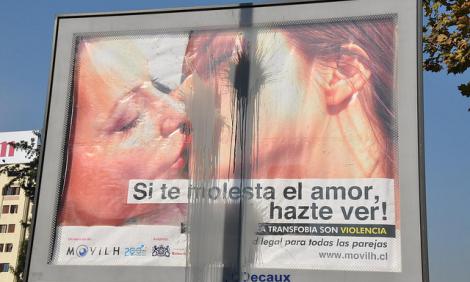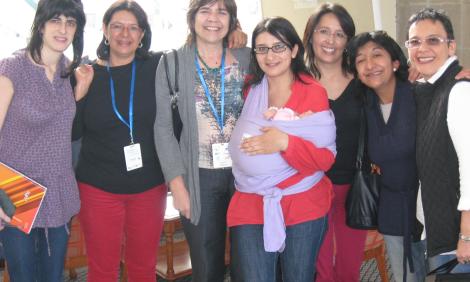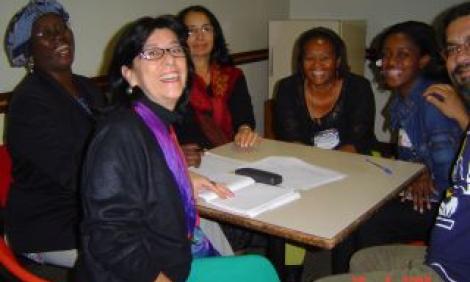
In depth
EROTICS in Brazil: The complex universe of sexuality on the internet
Sexuality Policy Watch and the Latin American Centre on Sexuality and Human Rights teamed up together to conduct the EroTICs research in Brazil. In an interview with Flavia Fascendini, they talked about their participation in the project as an opportunity to address the nuanced impact of new Internet legislation on sexuality. They approached this complex issue from two sides: looking at…
Feminist talk
Internet regulations can benefit from cross-sectoral conversations, says Marina Maria at the Human Rights Council
Marina Maria, a member of the Brazil EroTICs research team, was one of the panellists of the 'Internet rights are human rights' event co-organized by the APC with the Swedish Ministry for Foreign Affairs at the Human Rights Council’s 17th session in Geneva on June 3. Due to time limitations, she was not able to present her paper in full at the event. GenderIT.org is publishing her complete…
Publication
Feminist Tech Exchange - using technology in activism on women's rights (video, 15mins)
Dafne Plou presents on how dozens of Feminist Technology Exchanges - a series of capacity building workshops - are building the skills of women's rights organisations to use information and communication technologies in campaigning, monitoring and documentation to end violence against women. This presentation was part of the "Take Back The Tech! Reclaiming technology for women's rights" session…

Publication
EROTICS: Exploratory research on sexuality and the internet - summary report
What is the value of the internet in the exercise of sexual rights? From 2008 to 2010, the EROTICS research sought to answer this question, aiming to bridge the gap between policy and legislative measures that regulate content and practice on the internet, and the actual lived practices, experiences and concerns of internet users in the exercise of their sexual rights. The summary report provides…

In depth
Latin America in the run-up to the IGF: global and regional synergy
The Association for Progressive Communications (APC), NUPEF and the Registry of Internet Domain Names for Latin America and the Caribbean sponsored the Third Regional Preparatory Meeting for the Internet Governance Forum (IGF), held in Ecuador in early August 2010. How might this regional meeting and the IGF impact each other? What recommendations and concerns emerged from the regional process?…
In depth
Cybercrime laws are not enough, there is also a need for education
The different forms of online violence against women should be covered by criminal legislation to provide adequate protection and redress. However, laws are not enough. There is also a need for education, prevention, the development of defence mechanisms and a legal system that is capable of addressing these issues without subjecting the victims to further victimisation. Carlos Gregorio, a…
In depth
Feminist theory, practices and actions can lead to innovative solutions on internet governance
Civil society entities, academic figures and government officials met in Sao Paulo during the first few days of July to participate in the first seminar of the preparatory process for the meeting of the Internet Governance Forum, with the aim of developing proposals to take to that forum next November. Amongst the presentations, the talk “Internet governance and issues of gender” by gender and…

In depth
Tools discussed: Gender and ICTs in education and communication
More than 40 educators debated the importance of ICTs in edu-communication processes at a recent workshop held in Sao Paulo.The benefits of new information and communication technologies (ICTs) tools and platforms were analysed, including their democratising potential and gendered environment. The workshop was conducted through a Gender Evaluation Methodology (GEM) tool that, like its namesake,…
In depth
Wireless networks: Neither the territory of men nor women
Cris Ojeda, a network technician and Nodo Tau collaborator in Argentina, recounts her experience at a wireless roaming nework training project carried out in Paraguay, during which she was the sole female participant.
In depth
Women developing FLOSS - freedom for knowlege free from prejudice
Sulamita Garcia is a 28-year-old consultant who specialises in Unix systems and is completely enthusiastic about free and open source software. She is responsible for the LinuxChix Brasil project. In this interview for GenderIT, Sulamita tells about the recent experience of LinuxChix Brasil, which is delivering online courses on FLOSS for women. She speaks about prejudice, stereotypes and the…




